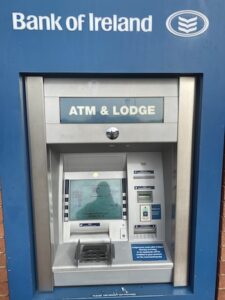 Much and all as it is fashionable to complain about Google now, sometimes the algorithm gets it just right. Over the weekend, my feed served me this headline: Man who was accidentally paid 330 times his salary quits and disappears (Unilad, 19 July 2024). Perhaps it is not my usual sort of news source, but it is certainly my usual sort of news – it is another example of mistaken overpayments on which I have regularly commented on this blog. As I have observed in that context, many have often adopted the approach of one of the white mice (who were, in fact, hyper-intelligent pan-dimensional beings) in Douglas Adams‘ The Hitchhiker’s Guide to the Galaxy (1979): when faced with a choice between doing the right thing, “and on the other hand just taking the money and running, then I for one could do with the exercise”.
Much and all as it is fashionable to complain about Google now, sometimes the algorithm gets it just right. Over the weekend, my feed served me this headline: Man who was accidentally paid 330 times his salary quits and disappears (Unilad, 19 July 2024). Perhaps it is not my usual sort of news source, but it is certainly my usual sort of news – it is another example of mistaken overpayments on which I have regularly commented on this blog. As I have observed in that context, many have often adopted the approach of one of the white mice (who were, in fact, hyper-intelligent pan-dimensional beings) in Douglas Adams‘ The Hitchhiker’s Guide to the Galaxy (1979): when faced with a choice between doing the right thing, “and on the other hand just taking the money and running, then I for one could do with the exercise”.
That is precisely what the overpaid employee did here. A Chilean meat-producer, Consorcio Industrial de Alimentos (Cial), sent a payment of CLP$165,398,851 (€160,283) to him, instead of his usual salary of CLP$500,000 (€485). It is a bizarre amount of overpayment; usually, a payment is made twice, or additional digits are added to a payment; but there is no obvious connection between the amounts of the salary and the overpayment here; it may be that the larger amount was meant for another account, or that somebody just entered a wrong random number. In any event, the article doesn’t explain it. Instead of repaying, the employee took the money and ran, then resigned and disappeared (Diario Financiero, 17 June 2022; see also Agriland.ie, 1 July 2022). At the time, Scottish Legal News noted it as an example of “… money for nothing” (and no doubt the errant former employee was singing Dire Sraits‘ Money for Nothing (Knopfler & Sting; 1985) (YouTube) all the way from the bank). He was still running six months later. And, as the article above shows, he is still running even now. But this is not really a good idea. The money will eventually run out. And the former employee will still be running, he will still have to repay, and he will still be liable to prosecution for theft.
Nor is this an isolated incident. In Oklahoma, education officials are attempting to recover at least US$290,000 (€268,000) in bonuses mistakenly paid to several teachers. In Kentucky, officials are attempting to recover at least US$239,000 (€221,000) mistakenly paid for tornado relief. And, in Omaha, Google mistakenly paid US$249,999.99 (€231,000) to a freelance hacker, and claimed it back (there seems to be no follow-up, so I assume he repaid it, as was his stated intention). A New Zealand hotel chain recently recovered an overpayment mistakenly paid to a removals company. And, in the UK, a retiring politician had to repay £16,876 in mistakenly-paid severance pay.
 I missed the Cial story in 2022, but I’m glad Google has served it up to me now: it reminds me that I didn’t cover an Irish example of mistaken payments when it happened last year. On Tuesday, 15 August 2023, Bank of Ireland suffered a major IT meltdown, which made international headlines: Free Cash in Ireland, at Least for a Moment, Thanks to a Bank Glitch (New York Times, 16 August 2023); People rush to ATMs after windfall from Bank of Ireland app glitch (Reuters, 16 August 2023); Bank of Ireland glitch let customers withdraw money they didn’t have (Guardian, 16 August 2023); Irish bank glitch let customers pull out large sums of ‘free money’—sparking huge run on ATMs (Fortune, 16 August 2023). Long queues of people formed in front of Bank of Ireland ATMs late that Tuesday night, hoping to get their hands on what they thought was free money. The Gardaí were – controversially – deployed at some of the ATMs. After the bank’s online services had been restored, it warned that money withdrawn during IT blunder would be debited from the customers’ account, but said it would not charge them interest; and it later gave them six extra months to clear overdrafts arising from those withdrawals. (I am grateful to Amelia O’Donnell for her research on this issue). In all of this, history was repeating itself for a second time. In June 2012, a massive IT failure affected another bank’s ATM network, resulting in claims by the bank to recover withdrawals not covered by funds in the accounts, and in prosecutions against some of the more fraudulent withdrawers. And, in December 2010, Bank of Ireland experienced a technical issue which meant that some of its customers were able to make ATM withdrawals of amounts greater than their available funds or credit. With apologies to Wilde, a glitch in 2010 may be regarded as a misfortune, another in 2023 looks like carelessness!
I missed the Cial story in 2022, but I’m glad Google has served it up to me now: it reminds me that I didn’t cover an Irish example of mistaken payments when it happened last year. On Tuesday, 15 August 2023, Bank of Ireland suffered a major IT meltdown, which made international headlines: Free Cash in Ireland, at Least for a Moment, Thanks to a Bank Glitch (New York Times, 16 August 2023); People rush to ATMs after windfall from Bank of Ireland app glitch (Reuters, 16 August 2023); Bank of Ireland glitch let customers withdraw money they didn’t have (Guardian, 16 August 2023); Irish bank glitch let customers pull out large sums of ‘free money’—sparking huge run on ATMs (Fortune, 16 August 2023). Long queues of people formed in front of Bank of Ireland ATMs late that Tuesday night, hoping to get their hands on what they thought was free money. The Gardaí were – controversially – deployed at some of the ATMs. After the bank’s online services had been restored, it warned that money withdrawn during IT blunder would be debited from the customers’ account, but said it would not charge them interest; and it later gave them six extra months to clear overdrafts arising from those withdrawals. (I am grateful to Amelia O’Donnell for her research on this issue). In all of this, history was repeating itself for a second time. In June 2012, a massive IT failure affected another bank’s ATM network, resulting in claims by the bank to recover withdrawals not covered by funds in the accounts, and in prosecutions against some of the more fraudulent withdrawers. And, in December 2010, Bank of Ireland experienced a technical issue which meant that some of its customers were able to make ATM withdrawals of amounts greater than their available funds or credit. With apologies to Wilde, a glitch in 2010 may be regarded as a misfortune, another in 2023 looks like carelessness!
Mistaken payments unjustly enrich the recipients (Moses v Macferlan (1760) 97 Eng Rep 676, 680-81; 2 Burr 1005, 1012; [1760] EngR 713 (19 May 1760) (pdf); Rochfort v Earl of Belvidere (1770) Wall L 45, 50 (pdf); Dublin Corporation v Building and Allied Trade Union (the Bricklayers’ Hall case) [1996] 2 IR 468, 483; [1996] 2 ILRM 547, 558, (24 July 1996) [37]-[40] (doc | pdf | html) (Keane J)); and (subject to defences (see, eg, here, here and here)) must be returned to the payors (Barclays Bank Ltd v WJ Simms, Son & Cooke (Southern) Ltd [1980] 1 QB 677, 69 (Goff J); Kleinwort Benson Ltd v Lincoln City Council [1999] 2 AC 349, [1998] UKHL 38 (29 October 1998); Test Claimants in the Franked Investment Income Group Litigation v Revenue and Customs [2022] AC 1, [2020] UKSC 47 (20 November 2020) [FII (No 2)]). So, “[w]hen money is paid by mistake … an obligation arises immediately under the law of unjust enrichment to reverse the enrichment by repaying the money (or an equivalent amount)” (Prudential Assurance Company Ltd v Revenue and Customs [2019] AC 929, [2018] UKSC 39 (25 July 2018) [69] (Lords Mance, Reed and Hodge, in a joint judgment, with which Lords Sumption and Carnwath concurred); an excellent recent consideration of the nature of the claim here is to be found in Chau Peter & Lusina Ho “Agreement and Restitutionary Liability for Mistaken Payments” in Sagi Peari & Warren Swain (eds), Rethinking Unjust Enrichment: History, Sociology, Doctrine and Theory (OUP, 2024) (chapter 9) 181 (SSRN)).
In National Bank v O’Connor & Bowmaker (1969) 103 ILTR 73 (Budd J) (doc | pdf), a fraud committed by one JE Thornton induced in the plaintiff bank the mistaken belief that it had received consideration for a draft for £12,000 presented by the first defendant, when it had not. Budd J held that the plaintiff was entitled to recover the £12,000 from the first defendant, inter alia, on the grounds of mistake ([113], [116], [120]-[121], [130]; following, inter alia, the decision of the House of Lords in RE Jones Ltd v Waring & Gillow Ltd [1926] AC 670; and see also Royal Bank of Ireland v Pentony [1941] IR 523 (SC) (discussed here); Nolan v Enniscorthy UDC (1955) 89 ILTR 12; Donal Rigney Ltd v Empresa De Construcoes Amandio Carvalho SA [2009] IEHC 572 (27 November 2009) (Laffoy J); Ringsend Property Ltd v Donatex Ltd [2009] IEHC 568 (18 December 2009) (Kelly J); Vanguard Auto Finance Ltd v Browne [2014] IEHC 465 (14 October 2014) [73] (Barton J); In re Custom House Capital Ltd [2021] IEHC 842 (13 October 2021) (Heslin J)).
Hence (prima facie, and subject to defences) those who receive overpayments into their bank accounts, or who make withdrawals from malfunctioning ATMs of amounts greater than their available funds or credit, have to make restitution of those overpayments or withdrawals. Moreover, they are also likely to be committing theft, contrary to section 4 of the Criminal Justice (Theft and Fraud Offences) Act, 2001, for which sentences ranging from a suspended sentence to four years imprisonment have been handed down. The moral of the legal story is: it’s not money for nothing, so don’t take it and run, however much you might like the exercise.
Here’s another example, by David Raleigh in the Irish Examiner (2 August 2024):